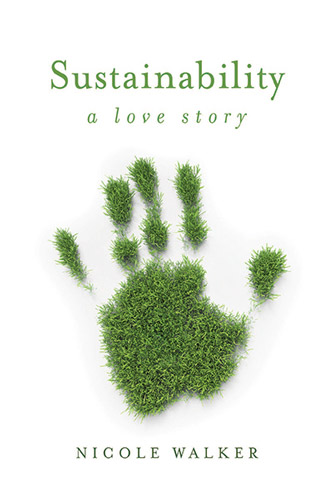Sustainability
Toward the middle of Sustainability: A Love Story, I decided to read slower in order to sustain it, if only for a minute longer. I didn’t want the journey to end, just as the author, Nicole Walker, doesn’t want the world to end; there are too many great things to live for, this book being one of them. It is composed of thirty-eight essays, all of which read like prose poems, stuffed with scientific research on topics such as recycling, McDonald’s, and suicide. Most of all, it’s a love story written to Portland, Oregon; Walker’s family; and the little blue dot.
Toward the middle of Sustainability: A Love Story, I decided to read slower in order to sustain it, if only for a minute longer. I didn’t want the journey to end, just as the author, Nicole Walker, doesn’t want the world to end; there are too many great things to live for, this book being one of them. It is composed of thirty-eight essays, all of which read like prose poems, stuffed with scientific research on topics such as recycling, McDonald’s, and suicide. Most of all, it’s a love story written to Portland, Oregon; Walker’s family; and the little blue dot.
The book focuses on being sustainable in the modern world where we’re surrounded by computers and gas-guzzling automobiles. Walker understands that she’s being hypocritical; she’s aware that she, too, drives a car rather than walking everywhere, and it’s very similar to Roxane Gay’s Bad Feminist in this manner. There’s a balance between judgement of others and self-deprecation. There’s also a balance between judgement and possibility. In the essay “Judgey McJudgerson” Walker sits in a parking lot—in her Honda CR-V, engine turned off—watching a man in a Cadillac Escalade. He, too, is just sitting there, but his engine is still running. Walker stares at the man, feeling superior in her helpfulness to the Earth, but then she thinks: maybe his toes are frostbitten, and he’s warming them up, or maybe he just got fired, and an idling car is the last thing on his mind. There are so many variables that make up how and why someone lives their life, and who are we to say they’re wrong?
Walker moved from Oregon, an area of the world known for its precipitation, to Arizona, a state in its 21st year of long-term drought, according to the Arizona State Climate Office. She often reminisces about the rain, and that juxtaposition of weather is genius, because it mimics the internal: the extreme, gung-ho mentality of restoration, and this (unfortunately) acceptable sense of inertia. When discussing the move, Walker expresses her contradictions, her Oregon and Arizona: “I love the sun. I also love the rain. I am lucky to see the sun and to hear the rain. If only there were two of me although two of me would then probably like to be four.”
Good is never good enough, the old saying goes. Walker has a loving husband named Erik, yet they argue over the most meaningless of issues, like Tupperware. Perhaps, arguments are a means to sustaining a relationship, like tossing pieces of paper into the fire, even if it’s hate mail. Walker does a phenomenal job illustrating the highs and lows of marriage, connectivity, and motherhood. She mentions that, before she had children, she was adamant about all sorts of causes: “Save the whales. Save the cougars. Lawn watering. Pulp factories. Stray cats.” But, now that she’s a mother, she has one volunteer project: “To make sure that [her] kids survive the day. Carrots. Seat belts. Helmets. Sunscreen.”
Sustainability: A Love Story is engrossing because on one page, Walker can go on about her children, and how much she adores them, how wondrous the Earth is, and so on, but on the next, she can delve into these suicidal thoughts that plague her brain. Walker discusses the association between suicide and art, and she wonders if they come from the same place. It seems to me that they do, as both are attempts to grasp the unknown. What does it matter, anyway? That’s another question that Sustainability: A Love Story tackles. It could be too late for us, even if everyone started driving a Prius.
Here are a few facts (seemingly arbitrary on their own) that this book has relayed:
Between 1998 and 2012, 156,577,260 Americans applied for gun permits.
American Indians and Alaska Natives die from alcoholism at a rate 514% higher than other Americans, according to Navajo Nation Vice President, Rex Lee Jim.
McDonald’s sells 75 hamburgers every second, 6,800,000 hamburgers per day.< br/>
There is a section of the book when the author’s mother is talking to one of Walker’s writer friends who appears to be an overall “happy” person. The mother asks how he could be a writer and be happy, going on to say that “Depth comes from sadness. To have anything interesting to say about the human condition, you have to go very deep. And low is deep.” I couldn’t agree more, but at the same time, underneath our smiling masks, there is this dark layer of sadness that she is talking about. But underneath that there is a burning ball of pleasure. Speaking of pleasure, Walker refers to wine a lot. This makes me happy, and I would strongly recommend that if you want to be happy too, buy a bottle of Oregon Pinot and read Sustainability: A Love Story. I would suggest purchasing the e-book to save trees, but it just doesn’t feel the same.





